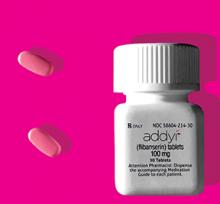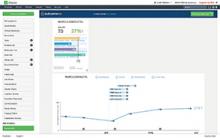FDA REMOVES ALCOHOL BAN WITH ADDYI
Sprout Pharmaceuticals announced that the US Food and Drug Administration (FDA) has removed their contraindication on alcohol use with Addyi® (flibanserin). Addyi was approved in 2015 and is an oral nonhormonal pill for acquired, generalized hypoactive sexual desire disorder (HSDD) in premenopausal women. Patients are advised to discontinue drinking alcohol at least 2 hours before taking Addyi at bedtime or skip the Addyi dose that evening.
The FDA also removed the requirement, under its Risk Evaluation and Mitigation Strategy (REMS) program, for health care practitioners or pharmacies to be certified to prescribe or dispense Addyi. Sprout says that to make all labeling elements consistent with the FDA’s findings the boxed warning will change and the medication guide will be updated and included under the REMS.
The most commonly reported adverse events among patients taking Addyi are dizziness, sleepiness, nausea, fatigue, insomnia, and dry mouth. Addyi is contraindicated in patients taking moderate or strong cytochrome P450 3A4 (CYP3A4) inhibitors and in those with hepatic impairment.
FOR MORE INFORMATION AND THE FULL PRESCRIBING INFORMATION AND MEDICATION GUIDE, VISIT: www.addyi.com
FEZOLINETANT FOR VMS
Astellas Pharma Inc. announced that it has initiated phase 3 trials for oral, nonhormonal fezolinetant to treat moderate-to-severe vasomotor symptoms (VMS) in postmenopausal women. Fezolinetant is a selective neurokinin-3 receptor antagonist, with dosages of 30 and 45 mg once daily being evaluated for efficacy and safety of reducing VMS frequency and severity. The trials each will enroll about 450 women with moderate-to-severe VMS at approximately 200 sites within the United States, Canada, and Europe. They will be double-blinded and placebo-controlled for the first 12 weeks, followed by noncontrolled 40-week extension periods. An additional 52-week trial will investigate long-term safety.FOR MORE INFORMATION, VISIT: http://www.clinicaltrials.gov, TRIAL IDENTIFIERS NCT04003155, NCT04003142, AND NCT04003389
SOLUTIONS FOR OUTCOME TRACKING
DrChrono and OutcomeMD announce a partnership to track and analyze patient outcome data and confounding factors. DrChrono is an electronic health record (EHR) system, and OutcomeMD is a software solution that uses literature-validated patient-reported outcome instruments to score and track a patient’s symptom severity and inform treatment decisions for users.
Via a HIPAA compliant process, patients answer a list of questions that are accessed through a web link on their mobile or desktop devices. OutcomeMD summarizes the symptoms into a score that displays to both the physician and patient. Patients’ answers and scores are pushed to the clinician’s DrChrono EHR medical note. As care progresses in the OutcomeMD platform, patients remotely track how their symptoms change, and notifications alert clinicians of patients who may need attention. The integration with DrChrono also allows patient data on confounding factors to be automatically pushed from the patient’s device into the clinician’s medical note. The partnership will enable physicians to visualize patients’ status, and all the factors involved in their care, on one screen, says DrChrono and OutcomeMD, strengthening documentation and saving time for both patients and clinicians. An integration demo video is available at https://youtu.be/jnh7YPII080.
FOR MORE INFORMATION, VISIT: www.outcomemd.com
Continue to: NEW MATERNITY GOWN...




